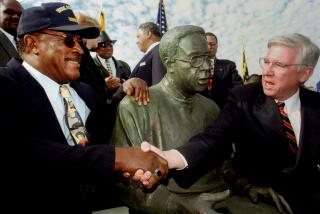Houseman Earned Our Respect
- Share via
We knew, of course, that John Houseman couldn’t go on forever. On the other hand, he had gone on forever, so why should he leave us now?
But he did, on Monday morning, at the age of 86. Not forgotten. Not neglected. And only slightly past his prime.
It amused Houseman that he ended his career as an actor: One of “the talent,” after a lifetime spent organizing the talent. This came about because director James Bridges thought Houseman would be perfect as Prof. Kingsfield in “The Paper Chase,” a great law professor trying to grind some rigor into the slack-minded young, just as the real John Houseman was trying to pound the disciplines of classical theater into his students at the Juilliard School of Acting.
Houseman was superb in the role. He would also have been excellent as a great Renaissance cardinal--a very worldly one, with an extensive knowledge of the kingdom of Caesar, but an ultimate commitment to the kingdom of God.
Houseman had an inordinate number of careers, starting with the stock market back in the ‘20s. Having gone broke in ‘29, he drifted into the theater, directing the original production of the Virgil ThomsonGertrude Stein opera “Four Saints in Three Acts” in ’34.
After that he did everything. First, theater with Orson Welles. Then--famously--radio with Welles. (How curious that he died 50 years and one day after the notorious Mercury Theatre of the Air production of “War of the Worlds.”)
Then, service with the Office of War Information in World War II. Then a long stint as a movie producer, everything from Alan Ladd in “The Blue Dahlia” to Marlon Brando in “Julius Caesar.” Then TV.
And always theater. In 1947, Houseman produced a new play called “Galileo” by some expatriate German writer named Brecht at a little theater called the Coronet in Los Angeles, a venture guaranteed to lose money, even with Charles Laughton starring.
It did, but Houseman had found back in ’29 that money wasn’t the point. Later, he took on the artistic directorship of the Stratford, Conn., Shakespeare Festival. Then he founded the UCLA Theatre Group, hiring a promising young fellow named Gordon Davidson to come out as an assistant for “King Lear.”
Always, at the top of his achievement, Houseman would drop out and go after some other chimera. In his several autobiographies, he acknowledges that there was something rather neurotic about this, but it did keep one on the hop.
Perhaps it also kept him from identifying too closely with the Kingdom of Caesar, which certainly had its fascination for him. Like our worldly cardinal, he knew exactly who the power players were in the world of entertainment, knew precisely what levers had to be pushed in order to make a project go. He had taken many a meeting and done many a lunch.
And then the tawdriness of the game would make itself apparent, and he would go off to run an acting school or start another doomed repertory company.
He was also generous with his time. When actress Agnes Moorehead died--an old comrade from the Mercury Theatre--I called him in New York to ask if he could write a quick memorial piece on her. He had a plane to catch in the morning--”but, yes, of course, I adored Aggie. Supposing I call you with it at 8. Will you be there that early?”
John Houseman. Our Talleyrand. Our elder statesman. Who also, naughtily, once did a commercial for Eggs McMuffin. Never mind. He didn’t get our respect by being a celebrity voice on TV. He earned it.
More to Read
The biggest entertainment stories
Get our big stories about Hollywood, film, television, music, arts, culture and more right in your inbox as soon as they publish.
You may occasionally receive promotional content from the Los Angeles Times.









